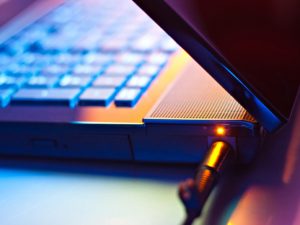 The United States government has urged the entire global airline community to ban large, personal electronic devices such as laptops in checked baggage due to a potential of causing a catastrophic fire.
The United States government has urged the entire global airline community to ban large, personal electronic devices such as laptops in checked baggage due to a potential of causing a catastrophic fire.
In a paper it filed with the an agency with the UN recently, the Federal Aviation Administration stated that tests it has performed showed that when the rechargeable lithium-ion battery of a laptop overheats near a can of aerosol spray, it could cause a large explosion that is cable of causing the fire suppression system of the airline to be disabled.
That fire could then be raging unchecked and lead to an aircraft lost.
The proposed UN agency ban will be on the agenda for the ICAO’s meeting on dangerous goods that is to be held during the week as well as next week in the Canadian city of Montreal.
Ten tests were conducted by the FAA involving a laptop that was fully charged and packed within a suitcase. A heater was affixed next to the battery of the laptop to force it to “thermal runaway,” which is a condition where the temperature of the battery continually increases.
In one of the tests, an aerosol can that was 8 ounces in size of dry shampoo, which is permitted in checked luggage, was strapped together with the laptop.
A fire started almost immediately and quickly grew, and within just 40 seconds the aerosol can had exploded.
This test showed that due to a rapid progression of this fire, fire suppressant systems of Halon gas used in cargo compartments of airlines would not be able to put the fire out, before the explosion, said the FAA.
The explosion may not be sufficiently strong enough to cause any structural damage to the airplane, but could damage the plane’s cargo compartment and allow an escape of Halon, said the FAA.
At that point nothing would prevent such a fire from spreading.
With other tests using laptop batteries packed inside suitcases with possible dangerous goods that are allowed in checked baggage, such as remover for nail polish, rubbing alcohol and hand sanitizer also resulted in fires, although there were no explosions.
Because of this, the paper had recommended passengers should not be allowed to check bags that contain large electronic devices unless they have been given special airline approval.
